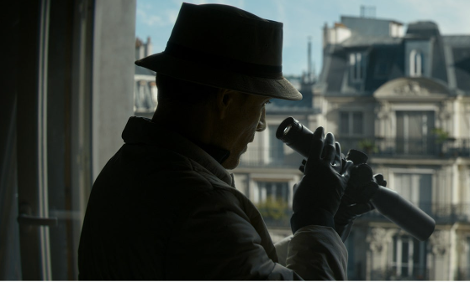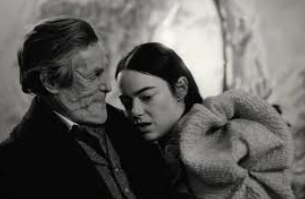The Killer

Cast: Michael Fassbender, Charles Parnell, Kerry O’Malley, Sala Baker, Sophie Charlotte, Tilda Swinton, Arliss Howard
Director: David Fincher
118 mins
David Fincher’s film, The Killer, calls back to the director’s Fight Club adaptation, letting the viewer in on an unnamed lead character’s inner monologue. In frank voiceover, the titular assassin (Michael Fassbender) relates thoughts that span from quotes to live by, to job-focused tactics to the mantra that keeps him fully concentrated. “Stick to the plan. Trust no one. Anticipate, don't improvise. Fight only the battle you're paid to fight.” He speaks of what he calls “the void of life,” and how his ability to recognise it sets him apart – not one of the many, but the few. In his seemingly untouchable way, though, he is part of an even more exclusive group: he is the only, and something about that is always ready to be cracked and broken by fate. The Killer is a return to form for Fincher, who has made meals of these kinds of stories in the past, but with this film, he expertly lays bare how untouchability is dismantled by emotion, and how that can force even the most calculated into a quest for a kind of absolution – even a bloody one. Fassbender’s character is unflinchingly good at his job, precise in all the ways that would make anyone capable of the emotional compartmentalisation necessary to be a first-rate murderer. Despite being a destroyer of worlds, the killer is, at least, truthful in his thoughts, and it allows the viewing audience to root for him as a complicated protagonist. We meet him keeping watch meticulously, doing yoga in a run-down Paris hideout. When a run-of-the-mill assignment goes wrong, he is forced to adjust his methods, craft a plan to save his skin, and get satisfying revenge in the only way he knows how.
Andrew Kevin Walker’s script – based on the French graphic novel series by Alexis “Matz” Nolent – strikes the right tone, giving the killer a compelling desire to keep control of his circumstances. Walker’s work even brings a sense of humanity to the character with small telling elements within the killer’s monologues – moments where we see that his emotional life is as rich as our own. Fassbender is smart and stylish in the role, giving us a quiet but weightily enigmatic performance that leans into the lone-wolf necessities of this perverse line of work. Occasionally, he seems like someone you might find fairly likeable if you met him on the street; in other moments, his ruthless brutality is on full display. Tilda Swinton has a small part in the film, but it's nevertheless a pivotal one, and she perfectly embodies the qualities of wise and seasoned, yet resigned. To give anything further away about her character would be a spoiler, but it’s a delight to see her show up in this story, even for just this one scene. Another short-but-sweet appearance in The Killer comes from a less likely source: BBC journalist Fiona Bruce - an interesting bit of casting. Naturally, the film is full of murders, but when the killing ramps up – and it does – the big fight scene is a joy. That may seem morbid, but the scene is impeccably choreographed, cut, and edited, to the point where it’s impossible to look away. The violence is captivating – which might say a lot about society, but Fincher capitalises on our proclivities, even the bloody ones, in a similar fashion to the way he did in Fight Club. There is also a sly but nifty reference to co-soundtrack supplier Trent Reznor’s other occupation as a member of a particular band. (Plus if you are a confirmed gladioli thruster, there are numerous songs from The Smiths appropriately offered across the entire feature). By the end of his odyssey, the killer admits something to us. If we too can see the void, then maybe we’re all actually just one of the many – and maybe, we’re like him. It’s a poignant closing moment and a reversal of his original philosophy that tells us something crucial about this character: he ultimately always wanted to be one of the many, one of the people who can shed the skin they live in and find some kind of peace within that void. With the ending Fincher and Walker give to the killer, full of satisfaction and a prescient calm after the storm, it seems like he may have got his wish.

Cast: Emma Stone, Mark Ruffalo, Willem Dafoe, Ramy Youssef, Jerrod Carmichael, Christopher Abbott, Suzy Bemba, Kathryn Hunter
Director: Yorgos Lanthimos
Running Time: 141 min.
Greek director Yorgos Lanthimos made the eerie, unsettling but undeniably brilliant The Lobster and The Favourite, where he portrayed egotistical games and brutal humans hurting each other and brutal, unforgiving worlds, shot through with odd and jarring visual imagery. Poor Things, however, is slightly different. It’s much less vicious than before, while it still offers up the bizarre visual flair that Lanthimos clearly relishes. Poor Things, based on the 1992 novel of the same name by celebrated Glasgow-born writer Alasdair Gray (1934-2019), is celebratory, wild, outrageous and hugely enjoyable, through its many layers of weirdness and visual extravagance. Emma Stone returns to work again with Lanthimos following her Oscar-nominated role in The Favourite but here in Poor Things, she is even more astonishing as Bella Baxter, a grown woman literally functioning within the throes of an infant’s brain, giving a physical but grounded performance. Her gait has elements of the Frankenstein creation’s jerkiness as she struggles to control her unfamiliar adult limbs with her head in a permanent swivel as she gradually embraces her ongoing fascination with the world. Faced with something she doesn’t care for, she glares her giant eyes up from under dyed-black beetled brows and then, usually, punches it. “Bluh,” she says gleefully, if the thing in question bleeds.
Bella lives with her guardian, Dr. Godwin Baxter (Willem Dafoe, gently avuncular). With no hint of irony, she calls him God. The gruesomely facial featured Godwin functions as an experimental surgeon working on the very edge of 19th-century science, and is the product of endless sadistic science experiments by his late father. Bella enjoys him being in his or her bed at night, but there’s nothing untoward going on between them, as he is impotent as a result of his father’s experiments - and he considers Bella to be his daughter. He brings her a suitor, sweet and innocent Max (Ramy Youssef).
However, Godwin will not allow Bella leave his home which is a wild and weird menagerie of his strange experiments and which Lanthimos films in moody black and white. Bella inevitably rebels enough to leave God behind and see the world, the screen blooms into hyper-saturated colour, all the blues removed, so that Bella becomes Dorothy walking into a gilded Oz.
Bella runs away to see the world with the help of the rakish Duncan Wedderburn (Mark Ruffalo, enjoying himself enormously), a lawyer with a well-oiled moustache and a permanent sneer. Duncan finds Bella’s naive approach and hunger for the world intoxicating, while she is won over by his willingness to help her discover sex. (Max chastely declines when Bella proposes they rub their genitals together.) “Why do people not do this all the time?” she demands of Duncan, post-coital and mystified. Once she’s on the continent, however, Bella does what girls do in Europe and discovers philosophy. Her mind thus expanded, she looks suspiciously at her lover’s near-sightedness. “My heart has become dim towards your swearing, weepy person,” she informs Duncan. Surviving Europe without Duncan will require Bella to dabble in both socialism and sex work, which she ably manages. Bella is infantilised Victorian femininity, a grown woman pushed by controlling men into living her life like a child. She finds redemption by taking control of her fate, body, and mind for herself as her radiant newborn mind embraces all that life has to offer her: sex, food, music, travel. She seems to watch her own life with the fierce scientific detachment she must have learned from her God. Faced with a choice, it’s generally clear to Bella what the wise thing to do is - and that’s the option she usually ignores. She goes for the interesting pathway instead. Bella is an enormously loveable character, a fitting heart for this hugely enjoyable film from one of the most divertingly original directors.